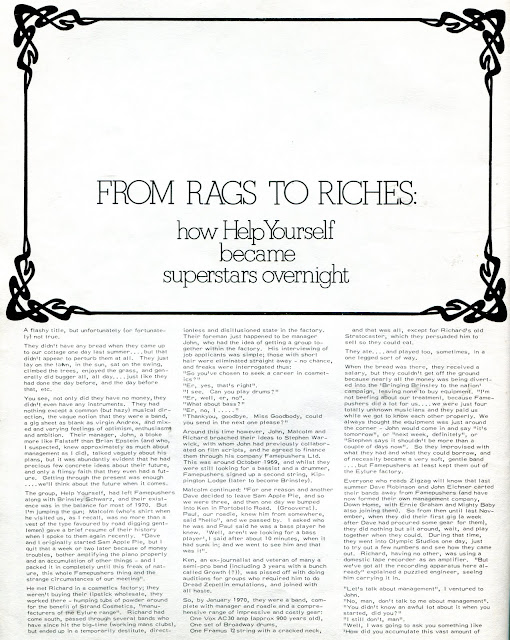Silver Apples (electronics wizard Simeon Coxe and ace drummer Danny Taylor) deserve to be remembered as one of the handful of generally groundbreaking acts in late 60s American rock. The New York-based duo’s June 1968 debut was perhaps the earliest album to incorporate breakbeats, found sounds and atonal noise into (more-or-less) conventional song structures, and at its best their beat-heavy electronic music still sounds dazzling and other-worldly. Their achievement is all the more impressive when one considers the sheer logistical complications (and frequent electric shocks) involved in mobilising their battery of oscillators, generators and synthesisers. Their two albums are uneven, but both contain astounding music, with flourishes that may be mainstream now, but must have sounded completely out-there at the time. As with most visionaries, they were little appreciated while in business, and not much original press concerning them exists. Here’s what I have.
Third was a three-page biography of Coxe, printed on yellow paper:
Silver Apples signed to the small, mainstream-oriented Kapp label in April 1968. Their debut album was released that June, and came with a silver foil sleeve (which is a nightmare to photograph). It also came with a surprisingly lavish fold-out colour insert, from which the pictures above are taken (they are posing in sensible sweaters with cats: the electronic rock look for 1968). Here's the whole thing:
On June 7th the tremendous Go magazine (America's only pop weekly of the 1960s, distributed via radio stations - ) ran the following article:
White-label mono copies were sent out as promos to the press and radio stations. Here's the hilarious press release that came with those, penned by one Tony Martell (who gives the strong impression that he'd rather be writing about a crooner):
Billboard covered the album in the same issue in which they wrote about the launch party. Billboard reviews tend to be bland, but this one contains the memorable comparison of the duo's music to 'the mating calls of two IBM machines':
The only other review I've encountered from the time was in Hi-Fi / Stereo Review's October 1968 issue, which dismissed it as 'moderately compelling' (though the reviewer does at least have the grace to concede that 'when it comes to the kinds and degrees of acidity, all I’ve got is Johnny Walker and heartburn, so I am probably not the best judge of such things’). On July 5th, Go ran this odd article, which gave as much attention to the duo's A&R man at Kapp, John Walsh, as to them:
(Walsh, incidentally, is thanked on the back of both their albums, with his Contact credit citing him as 'our Kapp contact and our local contact for...'). The same issue of Go contained an advert for the album, claiming that 'Silver Apples marry time to space through sound', as well as repeating the dumb instruction from the album's back cover to 'play twice before listening':
Coxe and Taylor played gigs on both coasts to support the record, as well as wasting no time in recording a follow-up. Contact appeared a mere five months later, in November, and advance copies were again accompanied by promotional material - but this time the PR wasn't handled by Kapp, but by Anonymous Arts, the hip company run by their manager Barry Bryant. First up was a general introduction to the new album, printed on pink paper:
Next came a biography of 'the simeon' (the name Coxe gave to the terrifying contraption he coaxed his electronic sounds from), printed on blue paper:
Third was a three-page biography of Coxe, printed on yellow paper:
And finally, having almost exhausted the colour options available at the time, there was a biography of Taylor on green paper:
On December 3rd the duo launched Contact with a week of gigs at New York's Cafe Au-Go-Go (supported by Pacific Gas & Electric, of all people). Billboard ran the following review in its December 14th issue:
and then offered these insights on December 28th:
General response was mixed. On January 3rd 1969, Go likened the LP to 'a wild jet plane ride' , while High Fidelity groused in April that it was 'full of interesting effects that are repeated endlessly, and would have been far more interesting if the liner notes had provided technical information. Still, at this point I’m ready to applaud anyone who can come up with even one new noise.' Stereo Review was even less fulsome in June, writing that 'Silver Apples jet into the nether-nether land of psychedelic, electronic-inspired musical tricks of tomorrow', adding that 'you need to be on a trip to get the most out of it. Stone cold sober and without the benefit of even an antihistamine tablet, it’s a bit puzzling', before concluding that 'you can’t listen to Silver Apples without experiencing an overwhelming impulse to break the record into several thousand pieces' and that 'Silver Apples drives cats and dogs bananas - so if you have pets, don’t play the record unless you want them to be unhappy.’ And that's as good an epitaph for them as I could ever devise.

.jpg)
.jpg)
















































